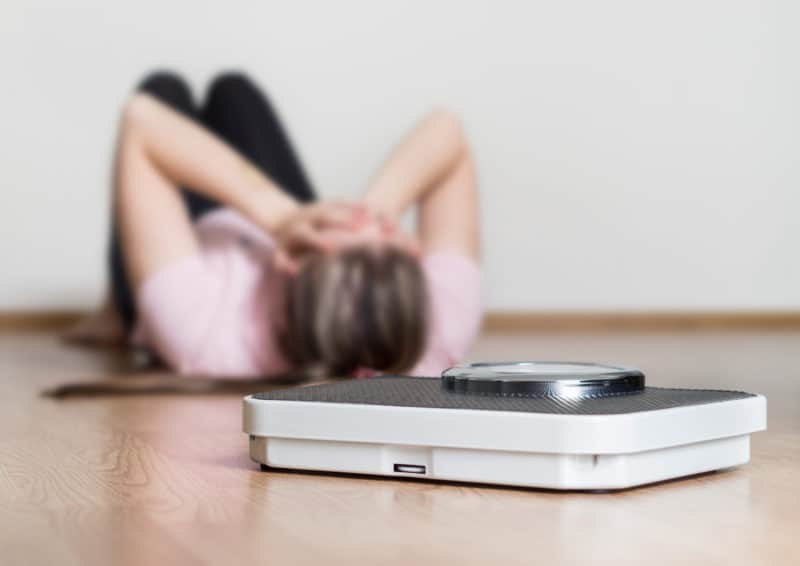

Are you one of the many who step on their bathroom scale every day to see if any progress has been made? For weeks or months you buckle down on your diet and workouts, only to see a marginal shift in numbers.
Most of us can only take so much of not witnessing any change – so this is about the time you want to scream, throw the scale across the room, and give up on your health. Sound familiar? I know I have personally been there!
The numbers on the scale can really haunt us. It can cause anxiety and result in constant disappointment that you’re not succeeding with your “weight loss goal.” But that digital number on your bathroom scale isn’t giving you an accurate picture of your TRUE progress.
This is because your overall weight on the scale depends on these factors:
- When did you last eat or drink?
- How much did you eat or drink?
- Did you workout or sweat?
- Did you eat a salty or high carbohydrate meal?
- What time did you weigh yourself?
- Is your bladder or bowel full?
- Has your stress dramatically increased recently?
These scales don’t take into consideration your lean body mass, your fat mass, or your water weight. This is because these scales only care about one thing and one thing only – your whole mass at that exact moment. Did you know that muscle mass actually weighs more than fat? You could be gaining lean muscle and losing fat which is why your number isn’t going down. This is why measurements are key to providing the true picture of what is happening with your body composition. You can of course use a tape measure to measure the inches lost, which is also useful information, however, can have some variation. Unless you are very precise with exactly where you are measuring each time, there can be a significant margin for error.
So, how do you accurately measure changes? It’s all about tracking your body’s composition.
To Weigh or Not To Weigh?
What an important question, but it truly depends on your relationship with the scale. It’s all the rage now to throw out your scale and never look at that digital number again. This could be good for some people who have an unhealthy obsession with that number. This number can cause them anxiety, frustration, and constant disappointment – for these people I say “Throw it out!” Be liberated and learn to track your body’s progress by measuring your body’s water, fat, and lean muscle content. For those with eating and over-exercise disorders, of course even tracking body composition numbers can become obsessive, and is not recommended, unless under the supervision of a physician.
For most, however, you might be making significant progress – losing weight and gaining lean muscle, but just not “seeing” it on the regular scale. This can cause your number to either increase or stay the same because muscle weighs more than fat. But because some people are so fixated on this number you lose sight of your true progress. This is also true of people trying to gain weight, you still want to know what kind of weight it is — fat, water, or muscle when you step on the scale.
For those who can handle the scale and for those who will continue eating healthy and working out no matter what that number is – keep it. If you only weigh yourself once a week and aren’t working yourself into a frenzy there’s no reason to throw it out. If you’re looking simply for weight loss progression and aren’t worried about gaining lean muscle the scale can be healthy for you. Weighing in once a week in the morning before you eat, and after you have used the restroom can track your progression in a healthy manner and show you true trends in your weight.
Why is Body Composition More Important Than Total Weight?
Body composition is your body’s proportion of fat mass versus fat-free mass. Fat-free mass includes everything but your fat tissue – muscles, organs, bones, and fluids. Advanced body composition analyzers using bioimpedance technology can look at fat mass, lean body mass, intracellular water, and extracellular water in various ways.
Fluids are an important one here. Our bodies are made up of mostly water – intracellular and extracellular. Meaning our body fluids are located either within our cells or outside of our cells contributing to 45-65% to our overall weight.
But sometimes we hold on to more water than usual like after a salty or high carbohydrate meal, or after a meal that has caused inflammation. Also, increased stress can raise cortisol levels, which then can cause water retention, fat gain, and muscle loss. So measuring your body’s composition will tell you if your fluctuations are because of your increase in fat, muscle, or water.
Knowing your body composition is so important to your health because having a healthy body composition can improve your risk of
- Diabetes
- Cardiovascular diseases
- Certain cancers
- Early mortality
- Renal disease
- Autoimmune diseases
Not only does your risks for these diseases improve, but you have an overall boost in self-confidence, energy level, and better sleep.
How Do You Measure and Track Your Body Composition?
It’s important for people who want to lose fat, gain muscle, and track water-weight to learn how to measure their body’s composition. This gives you accurate results of all your time and effort spent in the gym and eating healthy.
Determining your body composition is a simple equation – body fat mass divided by your total weight. To find out your body fat mass you’ll need a measuring tape. You can plug your measurements into this U.S. Navy Fitness Calculator here and determine your body fat percentage. There are disadvantages to tracking your body fat percentage this way because you’ll need exact measurements in the same place every time. And you’re only taking 3 measurements for your whole body so it’s an estimate of your body fat percentage.
There are new high tech scales on the market that send electrodes through your body to give you an estimate of percent body fat. If you’re looking for a cheap easier option, this could be right for you. But since you only have one point of contact on these scales the electrodes aren’t sent throughout your whole body. So again this is just a rough estimate of your body fat percentage.
One of the most accurate ways to measure your body’s composition is with an FDA-approved DexaFit scan. These scans can not only track your body composition but also provides information on your body’s posture and even reveals weak spots in your bone. Since it does use X-ray technology it is recommend only getting these scans done a couple of times per year.
Arizona Medical Wellness Medicine Helps You Track Body Composition – With Science
If you’re having trouble with weight loss – especially body fat – it’s important to track your body’s composition. It records your progression more accurately than your traditional bathroom scale. Some advanced bioimpedance analyzers, such as the InBody 570, have been proven to be just as accurate as DEXA scans, except without the radiation exposure and at a much lower cost. It is a non-invasive, FDA approved bioimpedance analyzer that sends safe electrode signals throughout your body to track your body fat, muscle, and water. Not only does it record your body composition by having 8 points of contact, but it includes valuable information such as pounds of lean mass per body segment, meaning you will get data on right and left arms and legs, as well as visceral fat (the fat around your abdominal organs that is especially damaging to health). It is a full page report of data on your body composition that your physician can over with you. We recommended measuring every 2-4 weeks to track your progress if you are actively trying to lose fat or gain lean muscle mass. If you are in the Scottsdale, Phoenix, Paradise Valley area, you can contact us to get set up for an appointment through Arizona Wellness Medicine or call (602) 892-4727.
Share:
Social Media
Most Popular Posts
Subscribe To Our Newsletter
Related Posts

How Fructose Intake Affects Metabolic Health: What You Need to Know
Fructose, found naturally in fruits and added to processed foods as high fructose corn syrup, impacts health. Learn the metabolic effects of fructose intake.

Get More Vitamin D for Better Health!
Of all the vitamins and minerals you should be sure you’re getting enough of, vitamin D is perhaps one of the most important. The benefits of vitamin D are widespread and pretty incredible.

The Science Behind Protein: The Optimal Amount of Protein in the Diet Based on Age and Activity Level
Different amounts of protein are needed at different stages of life. Learn about protein, how much you need, and what happens when you don’t get enough.

Magnesium: The Essential Mineral, Its Role in the Body, and What to Know About Magnesium Supplements
Learn about the mineral magnesium, its role in the body, how to spot magnesium deficiency, and the most bioavailable forms of magnesium to supplement with.
